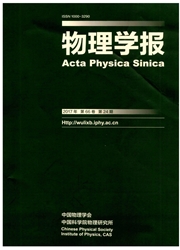

 中文摘要:
中文摘要:
针对相位梯度超表面在隐身技术中的应用,提出通过表面波耦合和异常反射两种机制复合实现宽频带后向雷达散射截面(RCS)缩减.采用开口谐振环进行相位梯度设计,实现了一种二维极化无关相位梯度超表面,在10GHz附近,超表面通过将垂直入射电磁波耦合为表面波实现RCS缩减,而在大于11GHz的频率范围内,相位分布的不均匀性使垂直入射的电磁波发生漫反射或者异常反射,降低后向RCS.制作了厚度为2mm的超表面样品,测试了其反射率曲线和后向RCS,并与相同尺寸的金属板进行了对比.实验结果表明,在宽频段内(9,5—17.0GHz),超表面在垂直入射情况下可将后向RCS缩减至少10dB.由于厚度薄、重量轻、频带宽,RCS缩减超表面在隐身新材料和新技术方面具有很大的应用潜力.
 英文摘要:
英文摘要:
Dealing with potential applications of phase gradient metasurfaces in stealth technologies, we propose to realize wide- band radar cross section (RCS) reduction by combining the two mechanisms of surface wave generation and anomalous reflection. A two-dimensional phase gradient based metasurface is designed using split-ring resonators. Around the designed central frequency f = 10 GHz, the incident waves are coupled into surface waves propagating along the metasurface. While at the frequency band f 〉 11 GHz, anomalous reflection and diffuse reflection occur. In this way, wide-band RCS reduction can be realized. A test sample with a total thickness of 2 mm is fabricated and its reflection and backward RCS are measured and compared with those of bare metallic plate with the same size. The comparison shows that the metasurface achieves more than 10 dB reduction in the measured wide range (9.5-17.0 GHz). The metasurface is a polarization independent, electrically thin, light-weight and wide-band, so it is of great application values in novel stealth technologies and materials.
 同期刊论文项目
同期刊论文项目
 同项目期刊论文
同项目期刊论文
 Simulation and experiment demonstration of a polarization-independent dual-directional absorption me
Simulation and experiment demonstration of a polarization-independent dual-directional absorption me Lowering plasma frequency by enhancing the effective mass of electrons: A route to deep sub-waveleng
Lowering plasma frequency by enhancing the effective mass of electrons: A route to deep sub-waveleng Achieving wide-band linear-to-circular polarization conversion using ultra-thin bi-layered metasurfa
Achieving wide-band linear-to-circular polarization conversion using ultra-thin bi-layered metasurfa Topology optimization design of a lightweight ultra-broadband wide-angle resistance frequency select
Topology optimization design of a lightweight ultra-broadband wide-angle resistance frequency select All-dielectric metamaterial frequency selective surfaces based on high-permittivity ceramic resonato
All-dielectric metamaterial frequency selective surfaces based on high-permittivity ceramic resonato Achieving wideband polarization-independent anomalous reflection for linearly polarized waves with d
Achieving wideband polarization-independent anomalous reflection for linearly polarized waves with d A Miniaturized Dual-Band FSS With Stable Resonance Frequencies of 2.4 GHz/5 GHz for WLAN Application
A Miniaturized Dual-Band FSS With Stable Resonance Frequencies of 2.4 GHz/5 GHz for WLAN Application 期刊信息
期刊信息
